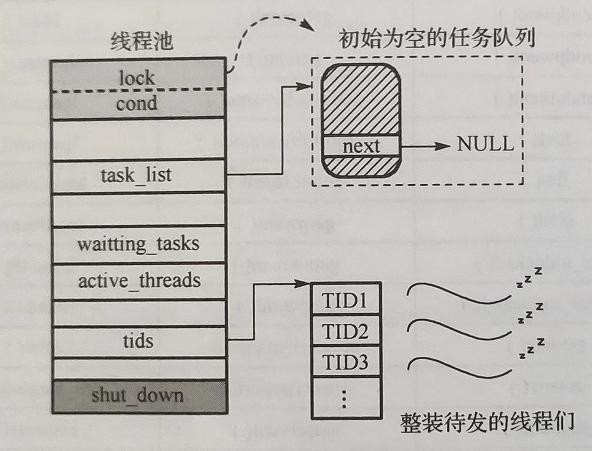本文简单介绍了线程池的概念和特点,对线程池的结构体和相关操作接口进行了设计,并提供了接口的具体实现,最后通过示例程序演示了线程池的运行过程。 简述 一个进程中的线程
一个进程中的线程就好比是一家公司里的员工,员工的数目应该根据公司的业务多少来定,太少了忙不过来,但是太多了也浪费资源。最理想的情况是让进程有一些初始数目的线程(线程池),当没有任务时这些线程自动进入睡眠,有了任务它们会立即执行任务,不断循环。进程还应根据自身任务的繁重与否来增删线程的数目,当所有的任务都完成之后,所有的线程还能妥当地收官。
如下图所示是一个处于初始状态的线程池。

图1 线程池示意图
有以下几点需要注意:
(1)任务队列中刚开始没有任何任务,是一个具有头结点的空链队列
(2)使用互斥锁来保护这个队列
(3)使用条件变量来代表任务队列中的任务个数的变化,将来如果主线程向队列中投放任务,那么可以通过条件变量来唤醒那么睡着了的线程
(4)通过一个公共开关----shutdown,来控制线程退出,进而销毁整个线程池
接口设计线程池相关结构体如下表所示。
下面是线程池的接口说明
(1)线程池初始化:init_pool()
(2)投放任务:add_task()
(3) 增加活跃线程:add_thread()
(4)删除活跃线程:remove_thread()
(5)销毁线程池:destroy_pool()
头文件thread_pool.h
//////////////////////////////////////////////////////////////////
//
// Description: 本文件包含了线程池基本结构体定义,以及各个操作函
// 数的声明
//
//////////////////////////////////////////////////////////////////
#ifndef _THREAD_POOL_H_
#define _THREAD_POOL_H_
#include <stdio.h>
#include <stdbool.h>
#include <unistd.h>
#include <stdlib.h>
#include <string.h>
#include <strings.h>
#include <errno.h>
#include <pthread.h>
#define MAX_WAITING_TASKS 1000
#define MAX_ACTIVE_THREADS 20
struct task
{
void *(*task)(void *arg);
void *arg;
struct task *next;
};
typedef struct thread_pool
{
pthread_mutex_t lock;
pthread_cond_t cond;
struct task *task_list;
pthread_t *tids;
unsigned waiting_tasks;
unsigned active_threads;
bool shutdown;
}thread_pool;
bool
init_pool(thread_pool *pool,
unsigned int threads_number);
bool
add_task(thread_pool *pool,
void *(*task)(void *arg),
void *arg);
int
add_thread(thread_pool *pool,
unsigned int additional_threads_number);
int
remove_thread(thread_pool *pool,
unsigned int removing_threads_number);
bool destroy_pool(thread_pool *pool);
void *routine(void *arg);
#endif
接口实现:thread_pool.c
//////////////////////////////////////////////////////////////////
// Description: 本文件包含了线程池操作函数的定义
//////////////////////////////////////////////////////////////////
#include "thread_pool.h"
void handler(void *arg)
{
pthread_mutex_unlock((pthread_mutex_t *)arg);
}
void *routine(void *arg)
{
thread_pool *pool = (thread_pool *)arg;
struct task *p;
while(1)
{
pthread_cleanup_push(handler, (void *)&pool->lock);
pthread_mutex_lock(&pool->lock);
while(pool->waiting_tasks == 0 && !pool->shutdown)
{
pthread_cond_wait(&pool->cond, &pool->lock);
}
if(pool->waiting_tasks == 0 && pool->shutdown == true)
{
pthread_mutex_unlock(&pool->lock);
pthread_exit(NULL);
}
p = pool->task_list->next;
pool->task_list->next = p->next;
pool->waiting_tasks--;
pthread_mutex_unlock(&pool->lock);
pthread_cleanup_pop(0);
pthread_setcancelstate(PTHREAD_CANCEL_DISABLE, NULL);
(p->task)(p->arg);
pthread_setcancelstate(PTHREAD_CANCEL_ENABLE, NULL);
free(p);
}
pthread_exit(NULL);
}
bool init_pool(thread_pool *pool, unsigned int threads_number)
{
pthread_mutex_init(&pool->lock, NULL);
pthread_cond_init(&pool->cond, NULL);
pool->shutdown = false;
pool->task_list = malloc(sizeof(struct task));
pool->tids = malloc(sizeof(pthread_t) * MAX_ACTIVE_THREADS);
if(pool->task_list == NULL || pool->tids == NULL)
{
perror("allocate memory error");
return false;
}
pool->task_list->next = NULL;
pool->waiting_tasks = 0;
pool->active_threads = threads_number;
int i;
for(i=0; i<pool->active_threads; i++)
{
if(pthread_create(&((pool->tids)[i]), NULL,
routine, (void *)pool) != 0)
{
perror("create threads error");
return false;
}
}
return true;
}
bool add_task(thread_pool *pool,
void *(*task)(void *arg), void *arg)
{
struct task *new_task = malloc(sizeof(struct task));
if(new_task == NULL)
{
perror("allocate memory error");
return false;
}
new_task->task = task;
new_task->arg = arg;
new_task->next = NULL;
pthread_mutex_lock(&pool->lock);
if(pool->waiting_tasks >= MAX_WAITING_TASKS)
{
pthread_mutex_unlock(&pool->lock);
fprintf(stderr, "too many tasks.\n");
free(new_task);
return false;
}
struct task *tmp = pool->task_list;
while(tmp->next != NULL)
tmp = tmp->next;
tmp->next = new_task;
pool->waiting_tasks++;
pthread_mutex_unlock(&pool->lock);
pthread_cond_signal(&pool->cond);
return true;
}
int add_thread(thread_pool *pool, unsigned additional_threads)
{
if(additional_threads == 0)
return 0;
unsigned total_threads =
pool->active_threads + additional_threads;
int i, actual_increment = 0;
for(i = pool->active_threads;
i < total_threads && i < MAX_ACTIVE_THREADS;
i++)
{
if(pthread_create(&((pool->tids)[i]),
NULL, routine, (void *)pool) != 0)
{
perror("add threads error");
if(actual_increment == 0)
return -1;
break;
}
actual_increment++;
}
pool->active_threads += actual_increment;
return actual_increment;
}
int remove_thread(thread_pool *pool, unsigned int removing_threads)
{
if(removing_threads == 0)
return pool->active_threads;
int remain_threads = pool->active_threads - removing_threads;
remain_threads = remain_threads>0 ? remain_threads:1;
int i;
for(i=pool->active_threads-1; i>remain_threads-1; i--)
{
errno = pthread_cancel(pool->tids[i]);
if(errno != 0)
break;
}
if(i == pool->active_threads-1)
return -1;
else
{
pool->active_threads = i+1;
return i+1;
}
}
bool destroy_pool(thread_pool *pool)
{
pool->shutdown = true;
pthread_cond_broadcast(&pool->cond);
int i;
for(i=0; i<pool->active_threads; i++)
{
errno = pthread_join(pool->tids[i], NULL);
if(errno != 0)
{
printf("join tids[%d] error: %s\n",
i, strerror(errno));
}
else
printf("[%u] is joined\n", (unsigned)pool->tids[i]);
}
free(pool->task_list);
free(pool->tids);
free(pool);
return true;
}
main.c
//////////////////////////////////////////////////////////////////
// Description: 一个使用了线程池的示例
//////////////////////////////////////////////////////////////////
#include "thread_pool.h"
void *mytask(void *arg)
{
int n = (int)arg;
printf("[%u][%s] ==> job will be done in %d sec...\n",
(unsigned)pthread_self(), __FUNCTION__, n);
sleep(n);
printf("[%u][%s] ==> job done!\n",
(unsigned)pthread_self(), __FUNCTION__);
return NULL;
}
void *count_time(void *arg)
{
int i = 0;
while(1)
{
sleep(1);
printf("sec: %d\n", ++i);
}
}
int main(void)
{
pthread_t a;
pthread_create(&a, NULL, count_time, NULL);
// 1, initialize the pool
thread_pool *pool = malloc(sizeof(thread_pool));
init_pool(pool, 2);
// 2, throw tasks
printf("throwing 3 tasks...\n");
add_task(pool, mytask, (void *)(rand()%10));
add_task(pool, mytask, (void *)(rand()%10));
add_task(pool, mytask, (void *)(rand()%10));
// 3, check active threads number
printf("current thread number: %d\n",
remove_thread(pool, 0));
sleep(9);
// 4, throw tasks
printf("throwing another 2 tasks...\n");
add_task(pool, mytask, (void *)(rand()%10));
add_task(pool, mytask, (void *)(rand()%10));
// 5, add threads
add_thread(pool, 2);
sleep(5);
// 6, remove threads
printf("remove 3 threads from the pool, "
"current thread number: %d\n",
remove_thread(pool, 3));
// 7, destroy the pool
destroy_pool(pool);
return 0;
}
zzc@zzc-virtual-machine:~/share/example/thread$ ./test
throwing 3 tasks...
current thread number: 2
[3981727488][mytask] ==> job will be done in 3 sec...
[3990120192][mytask] ==> job will be done in 6 sec...
sec: 1
sec: 2
[3981727488][mytask] ==> job done!
[3981727488][mytask] ==> job will be done in 7 sec...
sec: 3
sec: 4
sec: 5
[3990120192][mytask] ==> job done!
sec: 6
sec: 7
sec: 8
throwing another 2 tasks...
[3990120192][mytask] ==> job will be done in 5 sec...
[3892311808][mytask] ==> job will be done in 3 sec...
sec: 9
[3981727488][mytask] ==> job done!
sec: 10
sec: 11
[3892311808][mytask] ==> job done!
sec: 12
sec: 13
remove 3 threads from the pool, current thread number: 1
[3990120192][mytask] ==> job done!
[3990120192] is joined
实际使用的时候,只需将上述代码中的mytask函数改成我们需要实现的功能函数即可。
总结本文简单介绍了线程池的概念和特点,对线程池的结构体和相关操作接口进行了设计,并提供了接口的具体实现,最后通过示例程序演示了线程池的运行过程。
